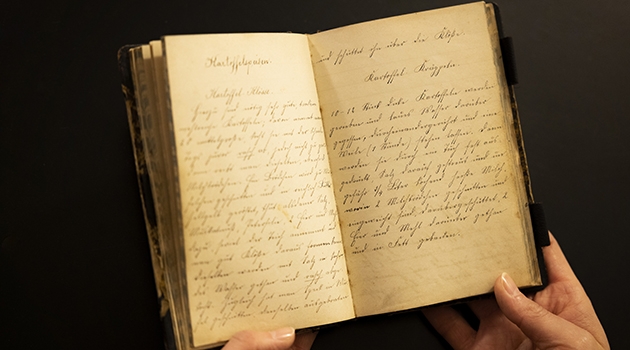Collecting recipes and the stories behind them
Historical recipes and cookbooks abound to teach us about past foods and dietary habits. Less is known about the people who actually wrote them. A historical documentation project based in Uppsala University is trying to change that.
In slightly faded letters, gracefully handwritten in pen you can read: “1 pound war flour”. “¼ liter of coffee or coffee substitute”. This wartime recipe for “False chocolate cake” bears clear witness to the impact ongoing world events can have on everyday life.
The recipe, one of many in a German family cookbook spanning from 1894-1956, now forms part of a bigger context: the historical documentation project Collecting Recipes. The project is initiated and run by Helga Müllneritsch, a postdoctoral researcher in German at Uppsala University.
“Collecting Recipes is an online project built around digitalization and transcription of cook book manuscripts from 1700-1945. The website displays digital facsimiles of the manuscripts with accompanying historical information on the authors and owners,” says Helga Müllneritsch.
Retracing people’s lives and habits
The project started with a pleasant surprise.
German at Uppsala University, has launched the
digital platform Collecting Recipes.
Photo: Mikael Wallerstedt
“Last year, I received a late nineteenth-century manuscript cookery book in the mail from a member of the public who heard about my research. He had collated family knowledge and material about the original owner of the manuscript in a way that was informative and could be interesting to the public. I was both very honoured and excited.”
“It inspired the idea of Collecting Recipes as both a way to share this information and invite further public involvement.”
Helga Müllneritsch’s research relates to material studies: a focus on physical manifestations of history rather than theoretical. This means she studies history via objects and documents, trying to discern networks of people’s lives and habits from what they left behind.
“I re-examine how women and men worked and socialised in the eighteenth century based on the mundane, everyday-life notes and artifacts of people who often remain anonymous since they have no connection to well-known contemporaries,” says Helga Müllneritsch.
The public is invited to participate
The project website is a way to address that issue and is now ready for use. She invites the public to participate in the project by sending in recipes and biographical information of the women and men who wrote them. Anything is welcome since this is a neglected part of history, and generally very little is known about historical recipe authors.
During the project, she has collaborated with fellow researcher Annie Mattson, formerly at Uppsala University. Annie is an expert on 18th century texts and can transcribe a variety of languages and writing styles.
“The handwriting gets increasingly difficult to read the further you go back in time, so her contribution has been very important.”
Food brings people together
Helga Müllneritsch now hopes the project will attract the interest of everyone interested in historical manuscripts or food history. From historians and linguists, to scholars of women’s and gender studies – to chefs. Helga’s goal is to sustain the project as part of a public or research institution, or secure direct funding through grants and donations.
“Anyone can eat and enjoy food and explore it further. Food brings people together and is a way to foster understanding between people,” concludes Helga Müllneritsch.
Anna Hedlund
Facts Collecting Recipes
- A digital platform for access to historical recipes and cookery books. The platform contains not just the recipes but also background information about the people who wrote them.
- The public is encouraged to participate, both in sending in manuscripts, recipes and cookbooks, and helping transcribe them.
- Every text is credited to the person who contributed.
- The project is supported by UU Innovation.
- Link to the Collecting Recipes online platform

